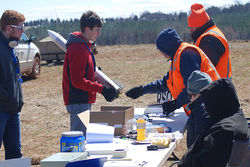
Battle of the Rockets
This competition consists of three events with a range of complexity to test all skill levels. The Target Altitude Event focuses on the rocket design skills. The Planetary Lander Event adds the complexity of designing an autonomous robot that must survive launch, deployment and landing and perform an operation autonomously.
Competition Guide
Advanced Planetary Lander Event
Design a rocket and planetary lander capable of launching to a minimum of 1000 feet and be able to deploy the planetary lander, at the peak. Upon reaching 1000 feet, the planetary lander must be deployed from the rocket before reaching 600 feet on its return. The planetary lander must be fully contained in the rocket before being deployed. Once deployed, the planetary lander must return to the ground safely.
Once landed, the planetary lander will be expected to perform different levels of operations for no less than 15 minutes. Telemetry must be transmitted at no faster than 1 Hz rate. A ground station must be developed to collect and display the telemetry received. Extra points are earned off the data is plotted in real time. If images are to be acquired from the lander, each image must be displayed on the ground station. Each image captured must be displayed. Newer images can replace older images on the ground station display.
Planetary Lander Kit Event - Teams Only
This event if for high school teams only. Teams must use a FoGE Planetary Lander Kit for the competition. Teams must assemble and program the kit to be launched from a rocket to an altitude of 1000 feet minimum, be deployed from the rocket, and safely land. After landing, the Planetary Lander kit must open and upright itself and start collecting sensor data and transmit it to a ground station. All operations are to be completely autonomous. Teams must integrate two additional sensors to the kit in addition to the sensors included. The sensors must be unique and not duplicate any other sensors. Telemetry must be transmitted once every one second. Teams must design and build a rocket to launch the planetary lander to a minimum of 1000 feet. The planetary lander must be deployed at an altitude no less than 600 feet. Teams must develop ground station software to collect all sensor data and display it in real time.
Target Altitude Event - Teams
Design and build a rocket to fly on any commercial certified G level rocket motor to an altitude of 1213 feet. The rocket closest to 1213 feet wins. The rocket must safely recover and be in condition to be flown again. The team must perform two successful flights meeting all the requirements out of three attempts. Two attempts must meet the requirements or be disqualified. The altitude difference from 1213 is used as the score. The scores from the two successful attempts are added together. The lowest score wins.
 |  |  |  |  |  |
|---|---|---|---|---|---|
 |  |  |
Winners of The Battle of the Rockets Competition
April 23 2016
University Altitude Event: Worcester Polytechnic Institute Escape Goats
High School Altitude Event: Thomas Jefferson High School TJ Excelsior
Video Payload Event: University of Maryland Terrapins
Mars Rover Event: Virginia Technical University
April 5, 2014
University Target Altitude Event: North Eastern University
High School Target Altitude Event: Chantilly High School
Egg Saucer Event: Chantilly High School
Mars Rover Event: University of Alabama, Huntsville
March 31, 2012
Target Altitude Event: Chantilly High School
Astro-Egg Lander Event: No winner
Mars Rover Event: University of Cincinnati Rocket Underground Team
April 10, 2010
G Altitude Event: Shippensburg University for 6774 feet
H Altitude Event: Shippensburg University for 9064 feet
Mars Rover Event: no winner
March 29, 2015
University Altitude Event: Penn State Saturn 5
High School Altitude Event: Chantilly High School
Spinning Payload Event: Chantilly High School IRE
Mars Rover Event: Team Cincinnati University Planet Express
April 2013
Target Altitude Event: University of Texas Arlington
Astro-Egg Lander Event: Yale University Team 1
Mars Rover Event: University of Texas Arlington
April 2, 2011
G Altitude Event: Shippensburg University for 7012 feet
H Altitude Event: no winner
Mars Rover Event: University of Texas Arlington
April 2009
G Altitude Event: Chantilly High School for 2281 feet
H Altitude Event: University of Texas Arlington for 6201 feet
Mars Lander Event: University of Cincinnati
Cansat Event: Thomas Jefferson High School


